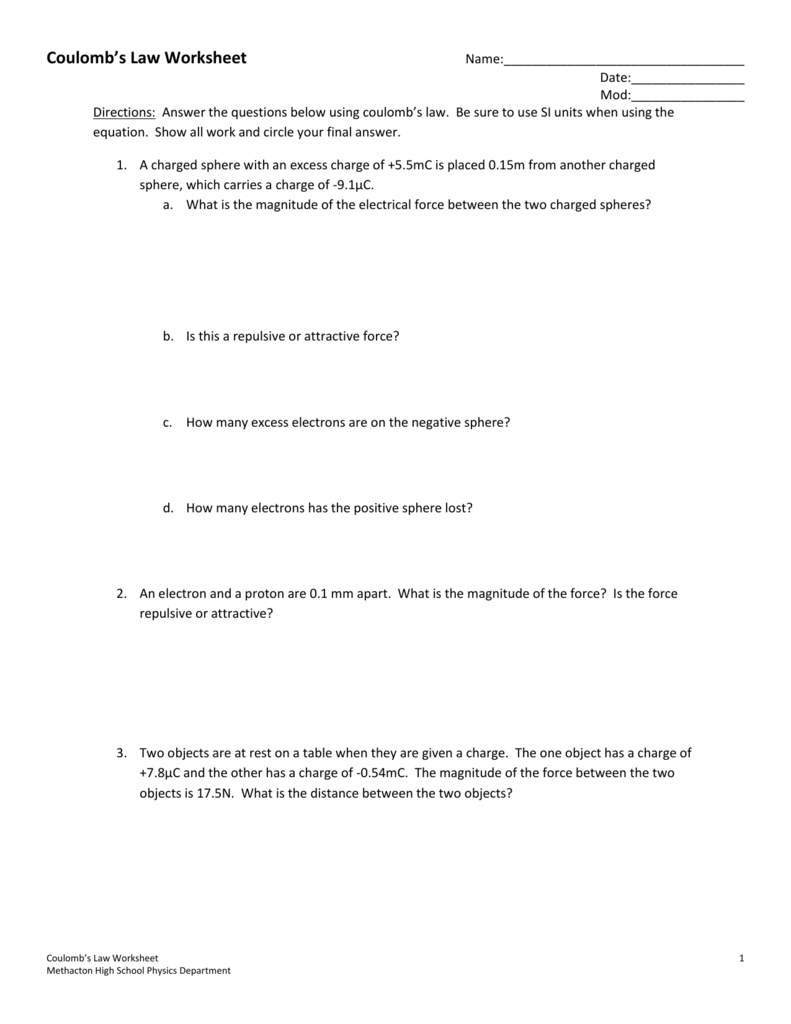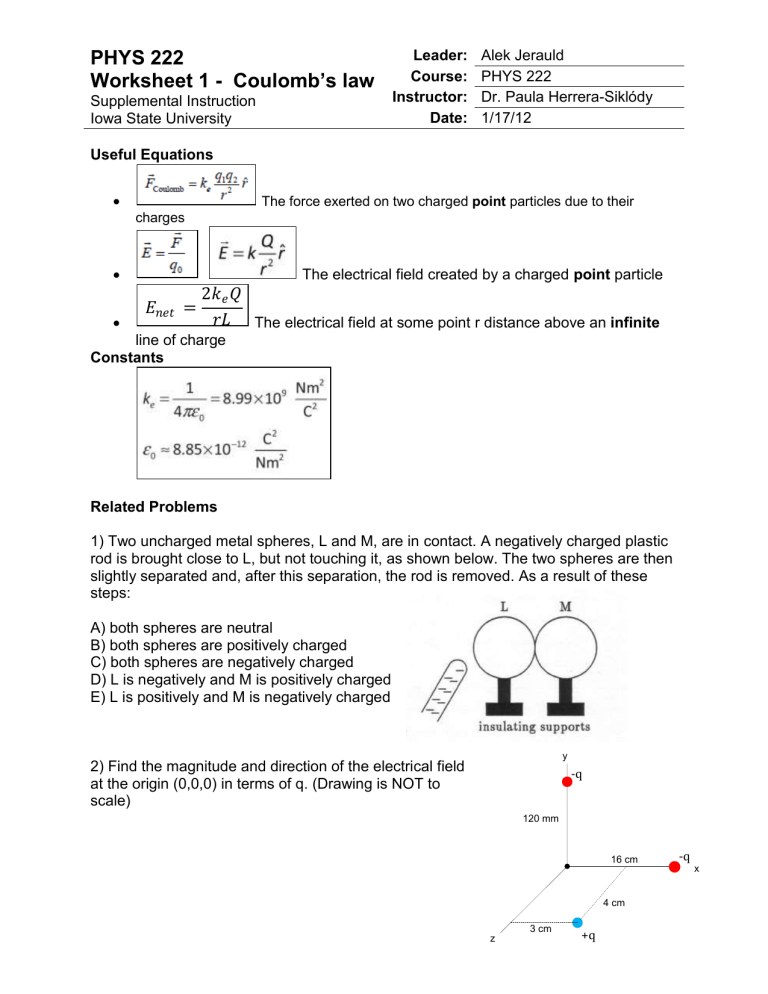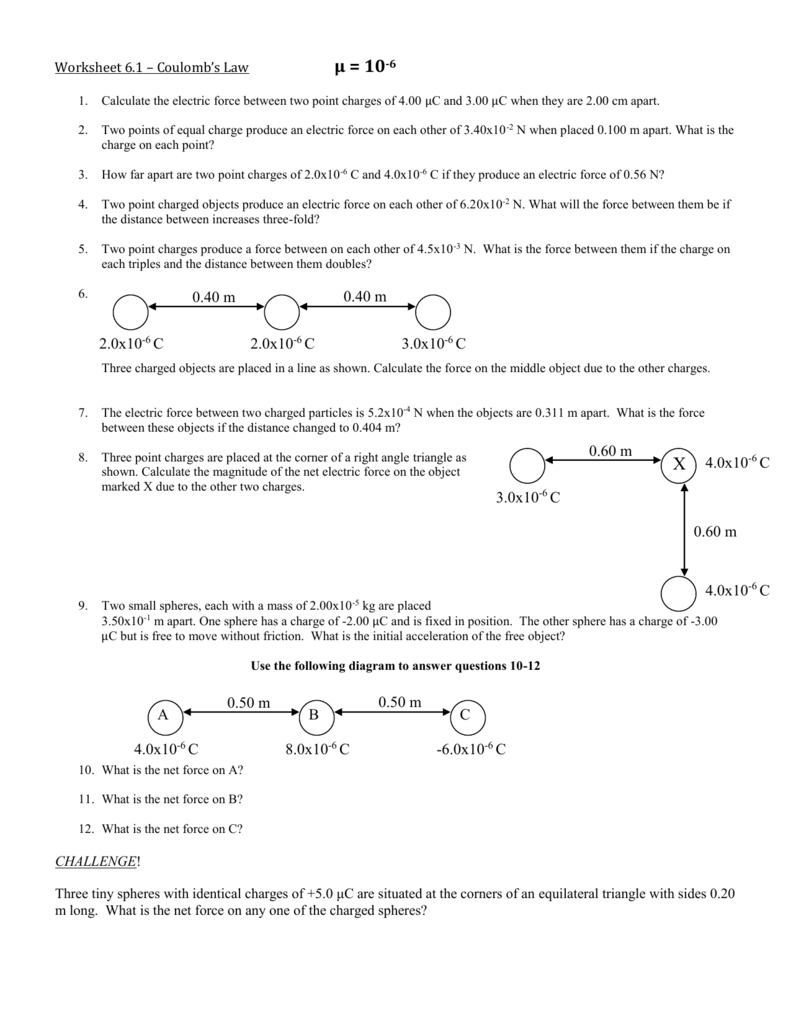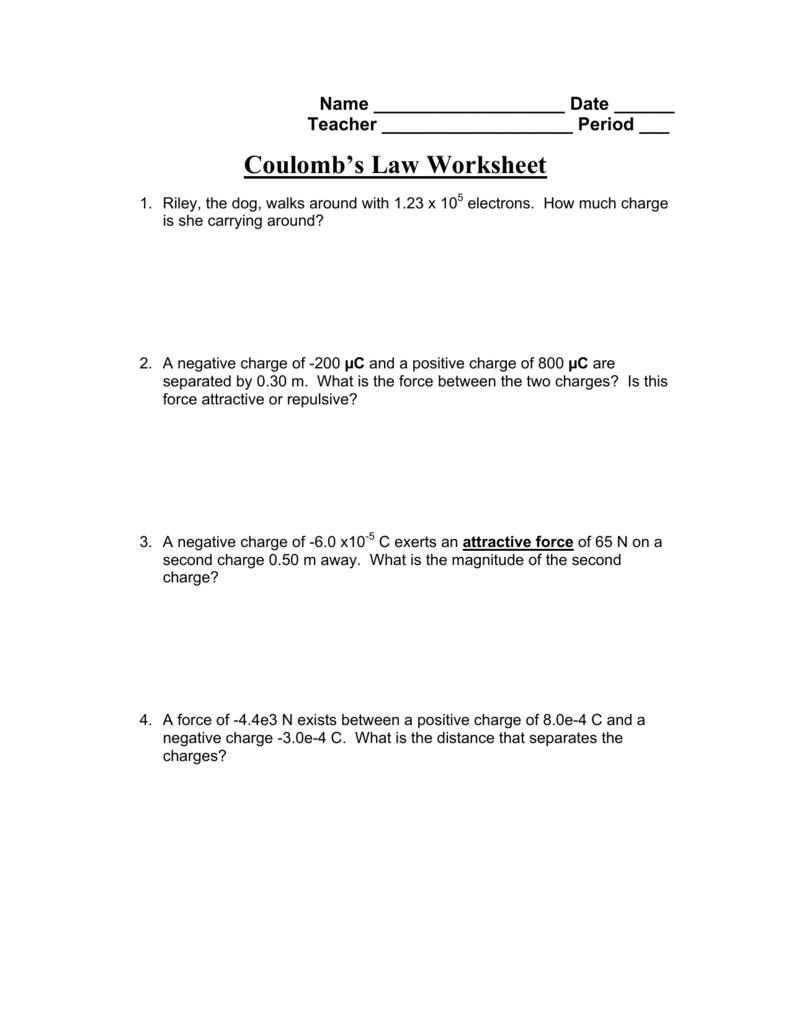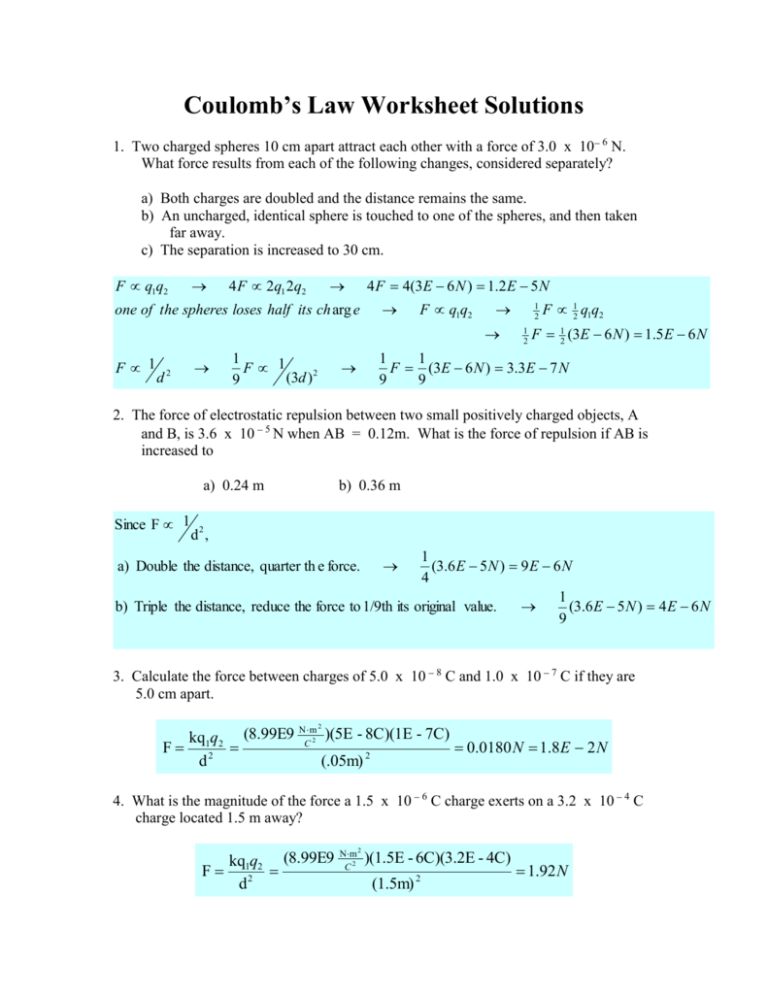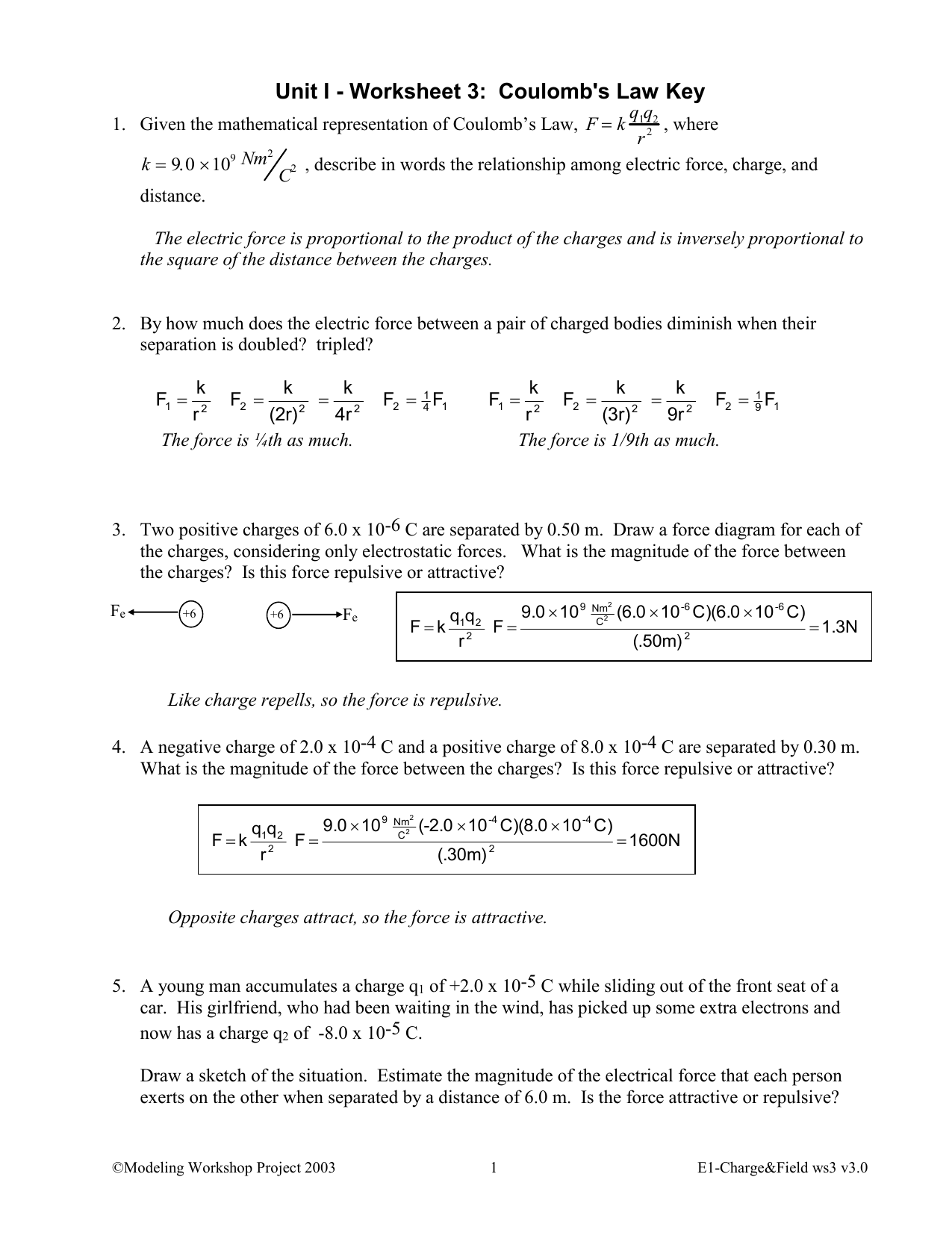Coulomb S Law Worksheet - Use coulomb’s law to explain the trend in ionization energies in terms of the relative location of the electrons and the charge of the. Coulomb’s law where f = electrostatic force, k = constant (. Determine the coulomb force of repulsion between the two balloons. Practice problems on coulomb’s law for the high school level, refer to here. × 2nm 2 /c ), q = charge, r = distance between the charges in a hydrogen atom, the. Unlock your full potential in ap physics 1 (2025) exam with our. Find the electrostatic force between charges of +2.0 c and +5.0 c separated by a distance of 75 m in a vacuum.
× 2nm 2 /c ), q = charge, r = distance between the charges in a hydrogen atom, the. Use coulomb’s law to explain the trend in ionization energies in terms of the relative location of the electrons and the charge of the. Find the electrostatic force between charges of +2.0 c and +5.0 c separated by a distance of 75 m in a vacuum. Coulomb’s law where f = electrostatic force, k = constant (. Unlock your full potential in ap physics 1 (2025) exam with our. Determine the coulomb force of repulsion between the two balloons. Practice problems on coulomb’s law for the high school level, refer to here.
Unlock your full potential in ap physics 1 (2025) exam with our. × 2nm 2 /c ), q = charge, r = distance between the charges in a hydrogen atom, the. Use coulomb’s law to explain the trend in ionization energies in terms of the relative location of the electrons and the charge of the. Find the electrostatic force between charges of +2.0 c and +5.0 c separated by a distance of 75 m in a vacuum. Determine the coulomb force of repulsion between the two balloons. Coulomb’s law where f = electrostatic force, k = constant (. Practice problems on coulomb’s law for the high school level, refer to here.
Worksheet Coulomb's Law PDF
Unlock your full potential in ap physics 1 (2025) exam with our. Determine the coulomb force of repulsion between the two balloons. Practice problems on coulomb’s law for the high school level, refer to here. Find the electrostatic force between charges of +2.0 c and +5.0 c separated by a distance of 75 m in a vacuum. Coulomb’s law where.
Coulomb's Law Worksheet Methacton School District
× 2nm 2 /c ), q = charge, r = distance between the charges in a hydrogen atom, the. Coulomb’s law where f = electrostatic force, k = constant (. Practice problems on coulomb’s law for the high school level, refer to here. Use coulomb’s law to explain the trend in ionization energies in terms of the relative location of.
PHYS 222 Worksheet 1 Coulomb's law
Use coulomb’s law to explain the trend in ionization energies in terms of the relative location of the electrons and the charge of the. Practice problems on coulomb’s law for the high school level, refer to here. Unlock your full potential in ap physics 1 (2025) exam with our. × 2nm 2 /c ), q = charge, r = distance.
Worksheet 6.1 and 6.2 Coulomb's Law and Electric Field on a
Use coulomb’s law to explain the trend in ionization energies in terms of the relative location of the electrons and the charge of the. × 2nm 2 /c ), q = charge, r = distance between the charges in a hydrogen atom, the. Coulomb’s law where f = electrostatic force, k = constant (. Find the electrostatic force between charges.
Coulomb's Law Worksheet
Unlock your full potential in ap physics 1 (2025) exam with our. Determine the coulomb force of repulsion between the two balloons. Use coulomb’s law to explain the trend in ionization energies in terms of the relative location of the electrons and the charge of the. Find the electrostatic force between charges of +2.0 c and +5.0 c separated by.
Coulomb's Law Calculations Worksheet Law Worksheet
Determine the coulomb force of repulsion between the two balloons. Practice problems on coulomb’s law for the high school level, refer to here. Use coulomb’s law to explain the trend in ionization energies in terms of the relative location of the electrons and the charge of the. Find the electrostatic force between charges of +2.0 c and +5.0 c separated.
Coulomb's Law Questions And Answers
Determine the coulomb force of repulsion between the two balloons. Use coulomb’s law to explain the trend in ionization energies in terms of the relative location of the electrons and the charge of the. Practice problems on coulomb’s law for the high school level, refer to here. Coulomb’s law where f = electrostatic force, k = constant (. Find the.
Coulombs Law Worksheet IB Physics 2 Name Period IB Physics II
Find the electrostatic force between charges of +2.0 c and +5.0 c separated by a distance of 75 m in a vacuum. × 2nm 2 /c ), q = charge, r = distance between the charges in a hydrogen atom, the. Use coulomb’s law to explain the trend in ionization energies in terms of the relative location of the electrons.
SOLUTION Coulomb s law worksheet solutions Studypool
Find the electrostatic force between charges of +2.0 c and +5.0 c separated by a distance of 75 m in a vacuum. Use coulomb’s law to explain the trend in ionization energies in terms of the relative location of the electrons and the charge of the. × 2nm 2 /c ), q = charge, r = distance between the charges.
CoulombsLawWorksheetAnswers1
Use coulomb’s law to explain the trend in ionization energies in terms of the relative location of the electrons and the charge of the. Coulomb’s law where f = electrostatic force, k = constant (. × 2nm 2 /c ), q = charge, r = distance between the charges in a hydrogen atom, the. Unlock your full potential in ap.
Practice Problems On Coulomb’s Law For The High School Level, Refer To Here.
Unlock your full potential in ap physics 1 (2025) exam with our. × 2nm 2 /c ), q = charge, r = distance between the charges in a hydrogen atom, the. Find the electrostatic force between charges of +2.0 c and +5.0 c separated by a distance of 75 m in a vacuum. Determine the coulomb force of repulsion between the two balloons.
Use Coulomb’s Law To Explain The Trend In Ionization Energies In Terms Of The Relative Location Of The Electrons And The Charge Of The.
Coulomb’s law where f = electrostatic force, k = constant (.

